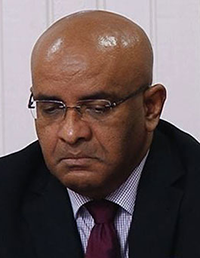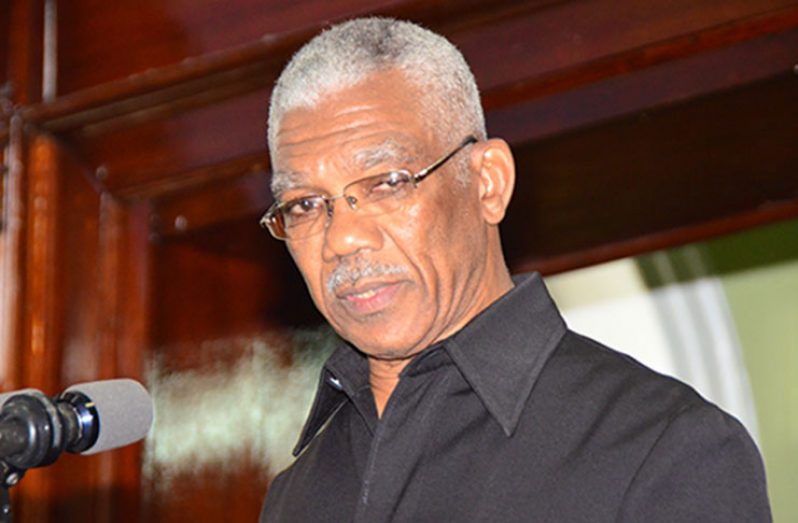— elections delayed twice under Jagdeo’s presidency without crisis
— had relied on GECOM for guidance records show
THE current political stalemate triggered by the passage of a no-confidence motion in the government and the likely delays in the holding of elections have raised alarming cries by some of an impending political crisis, but Guyana has been through similar challenges before, without any descent into anarchy.

Elections, in Guyana, were delayed several times without a crisis, and of those times, at least two were under the presidency of Bharrat Jagdeo.
Jagdeo has been erroneously arguing that Guyana will enter into constitutional crisis come March 22, if the Appeal Court does not dismiss the Chief Justice ruling in the confidence vote case. He has threatened, among other things, to not recognise the President and his Cabinet and even gone as far as urging his supporters to “chase” ministers out of their communities when they visit.
GECOM NOT READY
However, under his presidency twice elections were delayed without any crisis in society. In 2001, General and Regional Elections were due on January 17 in accordance with the Herdmanston Accord, however, the then President (Bharrat Jagdeo) had cause to delay the elections based on the advice of the Guyana Elections Commission (GECOM).
Records show that during a November 13, 2000, statutory meeting of the Elections

Commission, a decision was taken to advise the then President and leaders of the political parties in the National Assembly that it could not complete arrangements by January 17, 2001. At the time of the decision, 378,223 or 71.66 per cent of the estimated registrants were photographed for their new Identification (ID) cards, and more time was needed to complete the process. The then GECOM Chairman, Major General Joseph Singh had also indicated that more time was needed to train polling day staff.
“The Elections Commission met for more than seven hours, up to almost 22:00hrs (10pm) Monday and concluded that the polls cannot now be held by January 17 deadline the PPP/Civic and PNC agreed to under the Herdmanston Accord the Caribbean Community (CARICOM) brokered between them in January 1998,” Guyana Chronicle reported in its Wednesday, November 15, 2000 Edition under a story headlined “Late February, early March elections likely.”

PSC BACKS GECOM
In that very story, the Private Sector Commission (PSC) said it understood GECOM’s position and its quests for free and fair elections. “We did not think you could have an election of quality under the Herdmanston Accord timeframe, given the number of things still to be done, particularly the legislative process and the voter education programme,” the then PSC Director, David Yankana, had reportedly told the Commission.
He had called for the political parties to work out a new time framework that would have given GECOM the opportunity to put the necessary preparations in place without feeling pressured.
On Friday, November 17, 2000, GECOM had made public its inability to hold elections by January 17, 2001, and the international donor community, which was helping to fund the electoral process, had made it clear that the “date of the forthcoming election is a matter solely for the Guyana Elections Commission to recommend.”
DONOR COMMUNITY INSISTS CONDITIONS MUST BE RIGHT
“The donor community has insisted that conditions must exist for a free and fair electoral process and said it was up to the Elections Commission to advise if the polls could not be held by January 17,” this newspaper reported on Saturday, November 18, 2000 in an article titled “Commission confirms elections can’t be held by January 17.” One week later, on Friday, November 24, 2000, the Elections Commission, during a news conference, said it was moving ahead with preparations for the 2001 Elections and would advise on a possible date by the following week.
In another article published by this newspaper on Thursday, November 30, 2000, under the headline “Commission says elections could be mid-March – outlines new voting system,” GECOM outlined the new timeframe for the pending elections.
“The Elections Commission announced yesterday that it could have arrangements in place for general elections by March 19, sticking to a timetable observers had projected after the January deadline could not have been met,” the first line of the report read.
CREDIBILITY OF LIST
Back then, as is the case now, there was major concern over the credibility of the Official List of Electors. Currently, the list is deemed to be bloated. The situation in November, 2000 was no different, and the then Elections Commission Chairman, Major General Singh, had underscored the importance of sanitizing the list. On November 30, 2000, Major General Singh told a workshop that the Commission needed an “untainted list” of electors for the 2001 Elections.
“We have to come up with a clean list; (if not) there is no basis for an election,” the then GECOM Chairman had said. On December 5, 2000, GECOM announced that it would use results from a field test of names and other checks to produce an “acceptable” voters list for the pending elections. The Commission had drawn up a Preliminary Voters List (PVL) of some 516,000 from the National Register of Registrants (NRR) but indicated that the NRR was not up to date.
NOT STEPPING DOWN
While Jagdeo, now in opposition, is demanding that the President and his Ministers of Government step down following March 21, 2019, the record shows that while as President he made it clear that he was not stepping down after January 17, 2001.
In a press statement issued on Wednesday, December 6, 2000, the PPP/C made it clear that it was not leaving office following January 17. In that statement, it said “only free and fair elections can determine whether or not it vacates the seat of government and it clearly has no intention of demitting office by January 17, 2001.”
It continued: “It is the Guyana Elections Commission (GECOM) that said that elections cannot be held before March 19, 2001 (and) as such, the current administration is mandated by the Constitution of Guyana – the supreme law of the land – to administer the affairs of the nation until these elections are held.”
POLITICAL COOPERATION
On Thursday, December 7, 2000, Jagdeo, the then President, and the then Opposition Leader, Desmond Hoyte, after a 90-minute meeting, which included Dr. Rupert Roopnaraine of the Working People’s Alliance (WPA) and Manzoor Nadir of The United Force (TUF), agreed that the pending elections would be held on March 19, 2001. In a televised statement following the meeting, Jagdeo said “I shall expect and look forward to the leadership of all of the political parties, in the days ahead, to place the national interest above any partisan interest.
I expect, as well, the support of civil society in ensuring an environment conducive to the maintenance of the rule of law as we approach Election Day.” In total contradiction to this position back in 2000, Jagdeo, now in Opposition, has been allegedly inciting fear in society, and attacks on the current President and his ministers.
Jagdeo’s presidency in 2001, ahead of the elections. was confronted with more problems.
ELECTIONS VITIATED
On Monday, January 15, 2001, Justice Claudette Singh ruled that the amended legislation which provided for the use of the voter ID cards in 1997 was unconstitutional and, therefore, the elections was vitiated (invalid) on that limb. Her decision was as a result of an election petition brought by the then main Opposition People’s National Congress (PNC), through Esther Perreira, challenging the validity of the 1997 elections, which were won by the PPP/C.
Notwithstanding her ruling, Justice Singh on Friday, January 26, 2001, ruled that she had no power to order Jagdeo or the government to leave office. “I have no authority to ask the President, the Cabinet nor anyone in the government to step down…Therefore, the government will remain in office until the March 19 elections,” Justice Singh told a packed courtroom.
Again in 2006 under Jagdeo’s presidency, elections were delayed. The constitutional deadline was August 4, 2006, but GECOM was unable to meet it. In a statement on Tuesday, May 2, 2006, Jagdeo dissolved Parliament. Elections were later held on August 28 that year. The Jagdeo Administration had defended its position to extend the deadline for holding elections in the absence of the Opposition’s support.
FLEXIBILITY OF GECOM
According to the then government, the architects of the Constitution contemplated the “frailties” involved in setting timeframes. “Article 61’s main intent is to provide a cushion, some flexibility to GECOM in meeting its obligations to hold general elections within a constitutionally mandated timeframe after the dissolution of Parliament,” the PPP/C administration had said. The elections were held on August 28, 2006, after the then Chairman of the Elections Commission, Dr. Steve Surujbally, had indicated that the commission was in a position to conduct the elections.
In the current situation, President Granger is awaiting the advice of GECOM and support from the Opposition in the National Assembly in order to proclaim a date, as early as possible, for the conduct of General and Regional Elections.
PRESIDENT, MINISTERS REMAIN IN OFFICE
In putting the current political situation into perspective during a recent televised address to the nation, President Granger explained that the competence of the executive branch is essential to the viability of the state. Alluding to Article 106 (7) of the Constitution, he said the President and Ministers remain in office as provided for by the Constitution. According to that Article, “Notwithstanding its defeat, the government shall remain in office and shall hold an election within three months, or such longer period as the National Assembly shall by resolution supported by not less than two-thirds of the votes of all the elected members of the National Assembly determine, and shall resign after the President takes the oath of office following the election.”
CONTINUITY OF GOVERNMENT
He emphasized that the Constitution contemplates continuity of the government. “There is no legal impediment that restrains the government from exercising its functions or requires it to assume only ‘caretaker’ functions. The government continues to protect the country’s borders, natural resources, sovereignty and territorial integrity and to fulfil its international obligations. Citizens will continue to be provided with public services at the central, regional and local levels to ensure their welfare. Life goes on,” the Head of States asserted.
President Granger noted that the Constitution of the Cooperative Republic of Guyana is sacrosanct and supreme; the independence of the Judiciary and the Elections Commission is respected and the National Assembly is functional.
“First, the authority of the legislative branch is unimpaired. The National Assembly remains in session. This is essential because, under the Constitution [at Article 106 (7)], the Assembly could be summoned to expand the time for conducting General and Regional Elections beyond the period of 90 days from the time of the no-confidence vote on 21st December 2018,” he said.
The President, in defence of his position, alluded to the case of Attorney General v the Speaker of the National Assembly and the Leader of the Opposition, in which the Chief Justice Roxane George-Wiltshire stated that the Parliament is not dissolved as a result of the no-confidence motion. The Chief Justice had explained that it is the holding of elections which will be responsible for the dissolution of such a Parliament.
“The National Assembly, therefore, is still vested with the authority to provide the Elections Commission with the time and resources necessary for the conduct of credible General and Regional Elections,” President Granger said.




.jpg)









